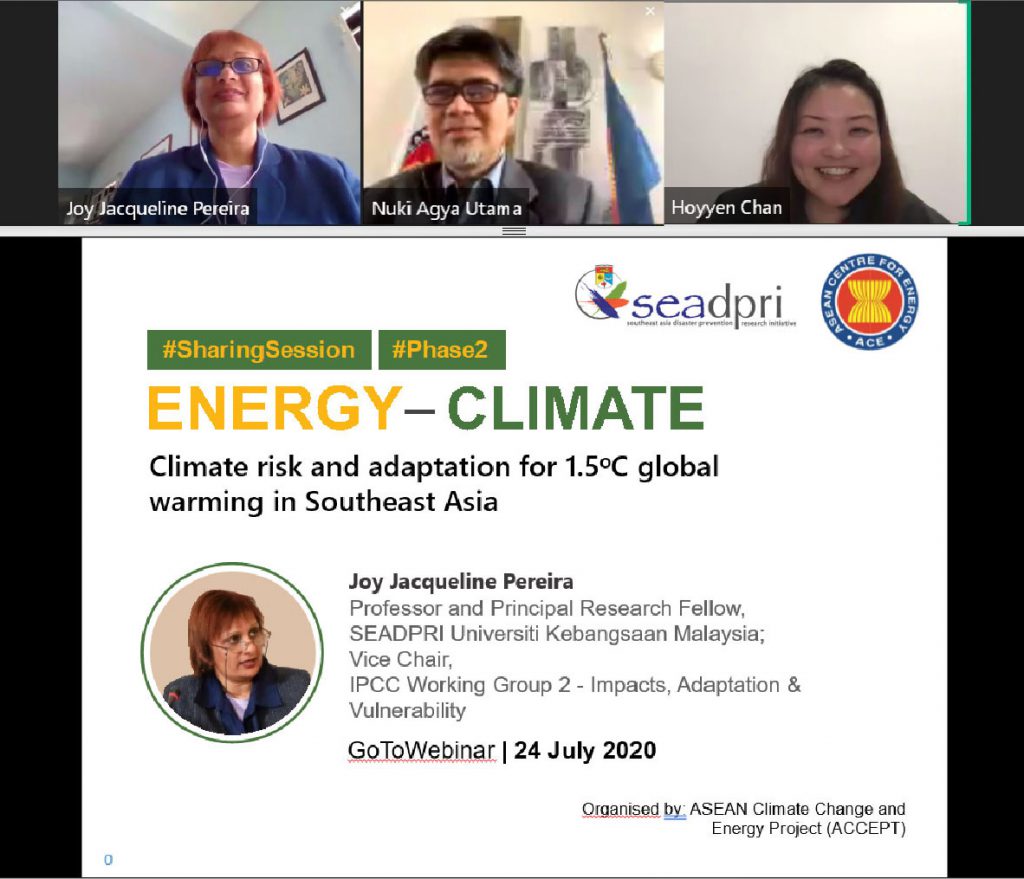Jakarta, 24 July 2020
The ACCEPT sharing session was back this week by inviting Prof. Dr. Joy Jacqueline Pereira FASc. to provide her insights through a webinar entitled “Climate risk and adaptation for 1.5oC global warming in Southeast Asia“.
Professor Joy is a principal research fellow at the Southeast Asia Disaster Prevention Research Initiative, Institute for Environment and Development, Universiti Kebangsaan Malaysia (SEADPRI-UKM). She is also the Vice-Chair of the Intergovernmental Panel on Climate Change (IPCC) Working Group II on Impacts, Adaptation, and Vulnerability. In this webinar, she was accompanied by Dr. Hoyyen Chan, a Senior Officer of Sustainable Energy, Renewable Energy, and Energy Efficiency of the ASEAN Centre for Energy (ACE), as the moderator.
The webinar began with the welcome speech by Dr. Nuki Agya Utama, the Executive Director of ACE. On this occasion, he introduced the key roles of ACE in the regional energy sector and its working programs for sustainable energy, energy transition, and energy resilience. These focus areas are also reflected in the ASEAN Plan of Action for Energy Cooperation (APAEC) Phase II with the theme “Accelerating Energy Transition and Strengthening Energy Resilience through Greater Innovation and Cooperation”.
Before continuing with Professor Joy’s presentation, a brief questionnaire with 2 polling questions was brought to the audience to find out their preliminary opinion regarding climate change risks and whether we should limit global warming. An interesting result was obtained from the first question, where the majority of participants (90%) had considered climate change as a serious threat to humans and the ecosystem. While for the second question, 92% believed we should limit global warming to 1.5°C limit, with 28% of them agreed to give priority to development and protect fossil fuel economy, and another 64% thought that although the cost of mitigation is expensive, it will become more expensive with time while impacts will erode economic gains.

The lecture from Prof. Joy started by mentioning the contribution of the IPCC, followed by the delivery of information about energy use that causes green house gas (GHG) emissions. These GHG emissions cause various problems such as extreme temperature changes and rising sea levels. It turns out that the majority is caused by human activity. Since pre-industrial times, humans have caused a rise in the earth’s temperature to 1°C and have caused various impacts. And if no changes are made, the temperature of the earth will increase.
In this case, careful action is very important. Apathy will only lead us to a far more negative impact. Prof. Joy also highlighted that if we could do something extraordinary about the COVID-19 pandemic, then we should be able to do extraordinary things to prevent the rise in the earth’s temperature. Although difficult, this is not impossible. Various scenarios are presented at this sharing session, and data shows that each country or region, especially the ASEAN Member States, must have its own target.
At the end of her presentation, Prof. Joy emphasised again that the longer we delayed, the higher the costs we would incur. Even the slightest increase in temperature will disrupt the economy of a country. We must work together with the government to improve our lifestyle so as not to damage nature even further.
This sharing session ended with an inspiring question and answer (Q&A) session. Here, it was discussed, among others, several potential ways that climate change could get more attention from the public, and how scientists and policymakers could interact with each other in order to produce science-based policies. At the end of the session, a similar polling question about limiting global warming was then conducted again. This time, there was around 10% increasing of respondents acknowledged the mitigation costs would rise over time and the impacts would harm economic growth. A message was later given by the speakers to remind us that the choice was ours. How we want our children and grandchildren to live will be based on our actions starting now.
For more details, please access the presentation file here, and watch the recording here. Feel free to contact the ACCEPT team if you need any further information. Stay safe and don’t forget to check out our COVID-19 page for more information on impacts of COVID-19 to energy and climate sector in ASEAN!
(RS/JS/R)